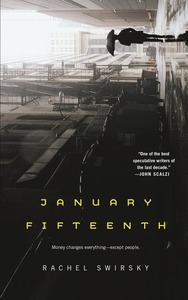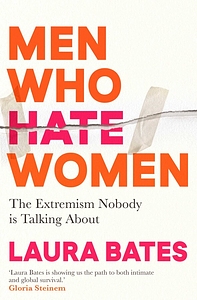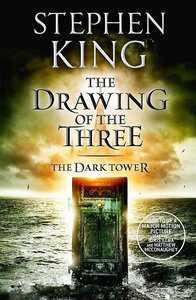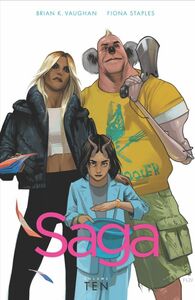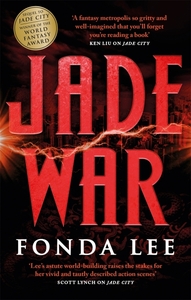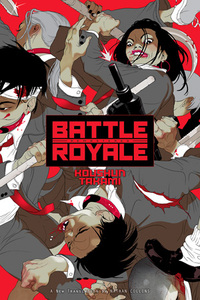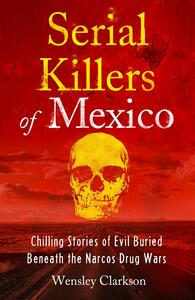You need to sign in or sign up before continuing.
Take a photo of a barcode or cover
stormlightreader's Reviews (936)
January Fifteenth attempts to explore the implementation of Universal Basic Income (UBI) for everyone, regardless of their financial situation.
In a nutshell, January Fifteenth uses 238 pages to tell us that people (particularly rich people) given free money will still be the same people they are without it. There was next to no plot and none of the characters were likeable (maybe Hannah).
The idea of UBI was interesting but lacked detail. We follow four women and their experiences with UBI. Olivia's story (a bunch of rich kids waste their UBI payments) served the single purpose of illustrating how wasteful the rich would be if they received benefits.
Using only 238 pages to explore a near-future world, four characters and the UBI scheme didn't work. She could've looked at two characters in more detail and focused on the effect of the UBI, rather than forcing more characters and as many societal issues as she could fit into the book.
It had so much potential. The author attempted to world build a near distant future, but it just ended up being current day with phones that you wear on your wrist.
This plot had so much potential but was poorly executed.
In a nutshell, January Fifteenth uses 238 pages to tell us that people (particularly rich people) given free money will still be the same people they are without it. There was next to no plot and none of the characters were likeable (maybe Hannah).
The idea of UBI was interesting but lacked detail. We follow four women and their experiences with UBI. Olivia's story (a bunch of rich kids waste their UBI payments) served the single purpose of illustrating how wasteful the rich would be if they received benefits.
Using only 238 pages to explore a near-future world, four characters and the UBI scheme didn't work. She could've looked at two characters in more detail and focused on the effect of the UBI, rather than forcing more characters and as many societal issues as she could fit into the book.
It had so much potential. The author attempted to world build a near distant future, but it just ended up being current day with phones that you wear on your wrist.
This plot had so much potential but was poorly executed.
challenging
dark
informative
fast-paced
An uncomfortable read but provides important information. It’s really shocking to know that there are groups of men that view women so negatively. Seriously, for the most part the mindset of these men is nauseating but at other times their core beliefs are downright laughable. Bates does warn the reader in the Introduction that there are dark themes ahead. As the author has been a recipient of death and rape threats from the types of men described in this book, I can imagine that writing it was hard.
Graphic: Death, Misogyny, Rape, Sexual assault, Sexual violence, Stalking, Sexual harassment
The biggest complaint I've heard about this series is how Brent Weeks describes women, but I didn't get far enough to get annoyed by that, I was just bored. The magic system had potential and was similar (in my opinion) to the magic system in Warbreaker, but I was done with the info dumping so early on.
This profession is something I read about and watch documentaries on with absolute fascination because of my interest in true crime and I can't be alone in that. But this book, hit so much closer to home than I expected.
The majority of the book is exactly what I expected but was more interesting because of it being based on the UK prison system. But it's the closing chapters that pushed this from a 4.5* to a 5*. Samworth discusses the impact of this profession on himself and his partner. The detail of how his partner felt watching his job change who he fundamentally was and the relief she felt when he got a sick note was so hard-hitting. He includes a little excerpt of how she felt while he worked there and it felt a little too real.
The narration was great too. It's so British, using common phrases like "complete ballache" and "ragged around" 🤣 I loved it!
The majority of the book is exactly what I expected but was more interesting because of it being based on the UK prison system. But it's the closing chapters that pushed this from a 4.5* to a 5*. Samworth discusses the impact of this profession on himself and his partner. The detail of how his partner felt watching his job change who he fundamentally was and the relief she felt when he got a sick note was so hard-hitting. He includes a little excerpt of how she felt while he worked there and it felt a little too real.
The narration was great too. It's so British, using common phrases like "complete ballache" and "ragged around" 🤣 I loved it!
I'm grateful for the Gunslinger recap at the start of this book because having read it 5 years ago, I remembered nothing about it. I enjoyed The Drawing of the Three way more than I did The Gunslinger. Even though it was slow, I liked the whole idea of the portals and how Roland is gathering his people. The setting (mostly set in NYC) was good and I love the so-called 'lobstrocities'.
I enjoyed the introduction of the new characters. At first I wasn’t fond of Eddie but I got to like him more. Odetta/Detta (two women living in one body) is an interesting one but I found one of them quite abrasive. Jack was interesting to read about and how his story linked with another character. I'm still unsure how much I like Roland but I'm quite taken with a gunslinger who is missing fingers and cannot use both guns. Great! I'm keen to know more about his fascination with The Dark Tower, but so far, I've not seen much about Roland that intrigues me.
Overall, I really enjoyed this one and it was a quicker read than I expected.
I enjoyed the introduction of the new characters. At first I wasn’t fond of Eddie but I got to like him more. Odetta/Detta (two women living in one body) is an interesting one but I found one of them quite abrasive. Jack was interesting to read about and how his story linked with another character. I'm still unsure how much I like Roland but I'm quite taken with a gunslinger who is missing fingers and cannot use both guns. Great! I'm keen to know more about his fascination with The Dark Tower, but so far, I've not seen much about Roland that intrigues me.
Overall, I really enjoyed this one and it was a quicker read than I expected.
There's books that suffer from middle book syndrome and then there's Jade War. If I hadn't heard so many reviews say that book three is AMAZING I would have DNF'd Jade War and just given up about 200 pages in. The first 530 or so pages (of 587) are a complete slog. There was a whole lot of nothing happening but a load of info dumping and new characters. THEN we had so much happening off the page with characters we actually care about from Jade City and what is with the time jumps?! What the hell! The action is minimal and at times I couldn't really see the point of the few fights scenes we did get.
Jade City was really good but I honestly don't know what's happened with Jade War. It doesn't feel like the same series. It's like I missed a book in between Jade City and Jade War. The atmosphere that was so well done in Jade City is practically non-existent in Jade War. Hilo seems weaker in this book and Shae is making questionable choices that seem completely uncharacteristic of her. Early on I felt that Wen was showing her value to the clan but then predictably she made a dumb decision, convincing Shae to ignore Hilo's demands and ends up harmed. Are we really surprised though? Also, where was Ayt Mada for the vast majority of this book?!
For me, Lan dying (by some dumb luck at the hands of an absolute idiot) in Jade City created a massive drop in intrigue for me. Killing off characters is fair enough and it raises the stakes and keeps you wondering whether your favourite characters are safe. The problem with Lan's death is that I don't feel like Hilo has taken up his position as Pillar particularly well and so it feels like a character type is still missing. Lan was level-headed and now the Kauls are left with hot-headed Hilo and Shae who seems to forget she's meant to be the brains of the clan. What is quite odd with Jade War, is how much Lan is still referred to and how much Hilo is compared to Lan/compares himself to Lan. Remembering their fallen brother is expected but I actually found that he got a fair bit of page time but it didn't feel authentic and just felt like it was there to serve the "we are a tight family" vibe. If this is serving as build up for him to return, then great. If not, it just feels forced and half-hearted.
There's lots of issues with pacing and it felt like there were new characters popping up all over the place, that either died shortly after being introduced/left to go to school/were just pointless obstacles put there to create a short-term problem for a main character. The title gives the impression that we're building up to something big but with both Jade City and Jade War ending on Bero's POV, I'm not hopeful for what comes next and I feel like this annoying termite will be alive at the end of the trilogy.
I am hoping book three ends the trilogy well but I have already decided I won't be revisiting this series in the future and I'm only finishing the trilogy out of pure curiosity.
Jade City was really good but I honestly don't know what's happened with Jade War. It doesn't feel like the same series. It's like I missed a book in between Jade City and Jade War. The atmosphere that was so well done in Jade City is practically non-existent in Jade War. Hilo seems weaker in this book and Shae is making questionable choices that seem completely uncharacteristic of her. Early on I felt that Wen was showing her value to the clan but then predictably she made a dumb decision, convincing Shae to ignore Hilo's demands and ends up harmed. Are we really surprised though? Also, where was Ayt Mada for the vast majority of this book?!
For me, Lan dying (by some dumb luck at the hands of an absolute idiot) in Jade City created a massive drop in intrigue for me. Killing off characters is fair enough and it raises the stakes and keeps you wondering whether your favourite characters are safe. The problem with Lan's death is that I don't feel like Hilo has taken up his position as Pillar particularly well and so it feels like a character type is still missing. Lan was level-headed and now the Kauls are left with hot-headed Hilo and Shae who seems to forget she's meant to be the brains of the clan. What is quite odd with Jade War, is how much Lan is still referred to and how much Hilo is compared to Lan/compares himself to Lan. Remembering their fallen brother is expected but I actually found that he got a fair bit of page time but it didn't feel authentic and just felt like it was there to serve the "we are a tight family" vibe. If this is serving as build up for him to return, then great. If not, it just feels forced and half-hearted.
There's lots of issues with pacing and it felt like there were new characters popping up all over the place, that either died shortly after being introduced/left to go to school/were just pointless obstacles put there to create a short-term problem for a main character. The title gives the impression that we're building up to something big but with both Jade City and Jade War ending on Bero's POV, I'm not hopeful for what comes next and I feel like this annoying termite will be alive at the end of the trilogy.
I am hoping book three ends the trilogy well but I have already decided I won't be revisiting this series in the future and I'm only finishing the trilogy out of pure curiosity.
In a nutshell: a bunch of kids are thrown together to kill each other until there's only one survivor. These kids are so dumb in so many ways. Fancy thinking you'd get away with hacking a laptop in a controlled Battle Royale when these government officials are watching EVERYTHING then being (*insert Pikachu meme*) surprised to find out...they knew what you were doing! 🤦♀️
It's blatantly obvious where The Hunger Games came from but I have to say that I prefer THG. THG is almost identical to BR even down to the two survivors and the survivor re-entering the following year but THG succeeds in having characters that I cared about where BR doesn't, so for this entire book I was just reading for the fun student countdown at the end of every chapter.
There is backstory provided on each BR character but for me I think the number of students in BR is far too high to expect me to connect with any particular one, even though technically there are a few characters that are the 'main characters' but I didn't care for these. There's a lot of repetition with some of the characters, their quirks and their hobbies, which became tedious by the halfway point.
This took longer to read when it really shouldn't have.
It's blatantly obvious where The Hunger Games came from but I have to say that I prefer THG. THG is almost identical to BR even down to the two survivors and the survivor re-entering the following year but THG succeeds in having characters that I cared about where BR doesn't, so for this entire book I was just reading for the fun student countdown at the end of every chapter.
There is backstory provided on each BR character but for me I think the number of students in BR is far too high to expect me to connect with any particular one, even though technically there are a few characters that are the 'main characters' but I didn't care for these. There's a lot of repetition with some of the characters, their quirks and their hobbies, which became tedious by the halfway point.
This took longer to read when it really shouldn't have.
I listened to the audiobook for this and it was so difficult to listen to. The narration is so robotic and actually sounded like a text-to-speech sort of narration and the narrator ends every sentence with this odd inflection. Awful. The book is very short and definitely could've provided more detail. I don't jump at the chance to read Rosewood's books because they are usually littered with spelling errors and this one is no different. The narrator also incorrectly pronounces things too. Cannot recommend.
Every now and then I like the kind of true crime book that gives a snapshot of different serial killers, which usually makes me want to read more on specific killers.
Serial Killers of Mexico doesn't give any deep examination of the cases or the killers but the overviews are interesting and piqued my interest in Mexican serial killers. I enjoyed the way this book presented a little on a lot of serial killers, including their backstory, their crimes and their sentencing.
I wasn't familiar with any of these cases, so it was unique in that aspect.
Serial Killers of Mexico doesn't give any deep examination of the cases or the killers but the overviews are interesting and piqued my interest in Mexican serial killers. I enjoyed the way this book presented a little on a lot of serial killers, including their backstory, their crimes and their sentencing.
I wasn't familiar with any of these cases, so it was unique in that aspect.
